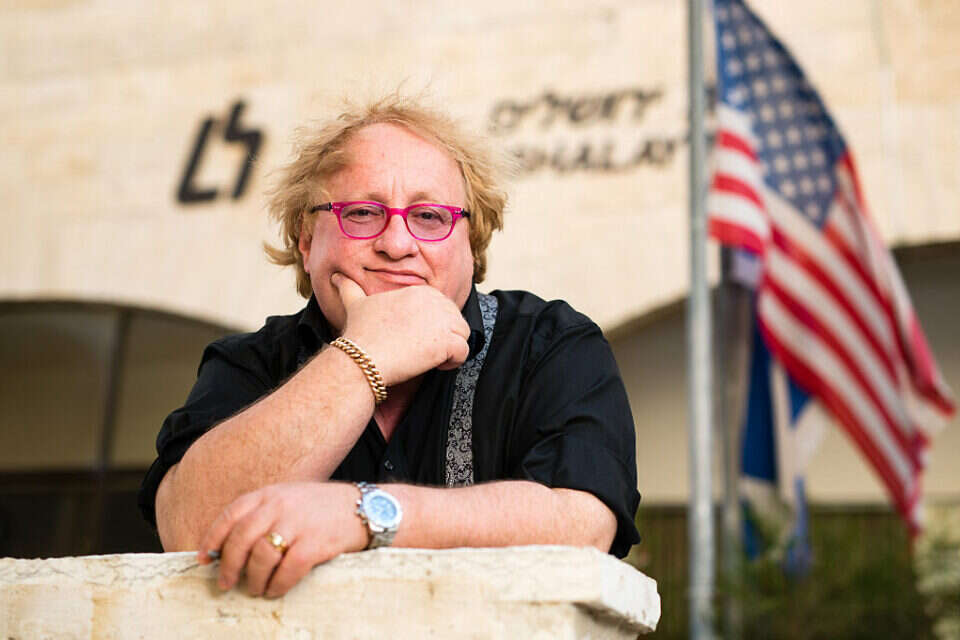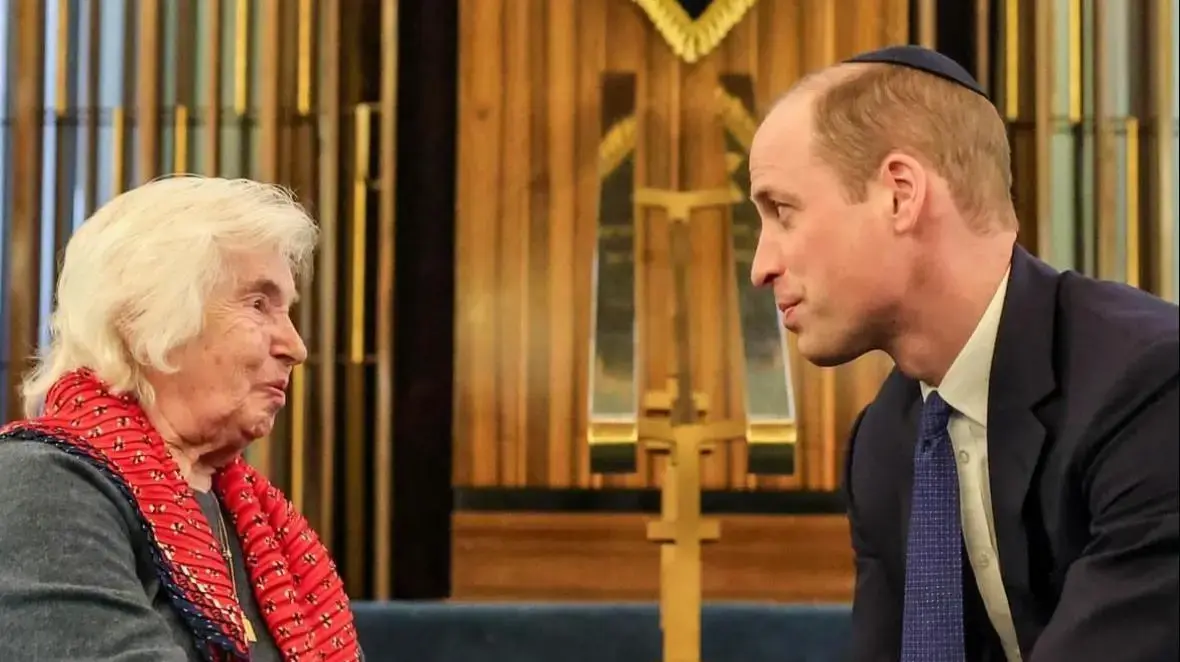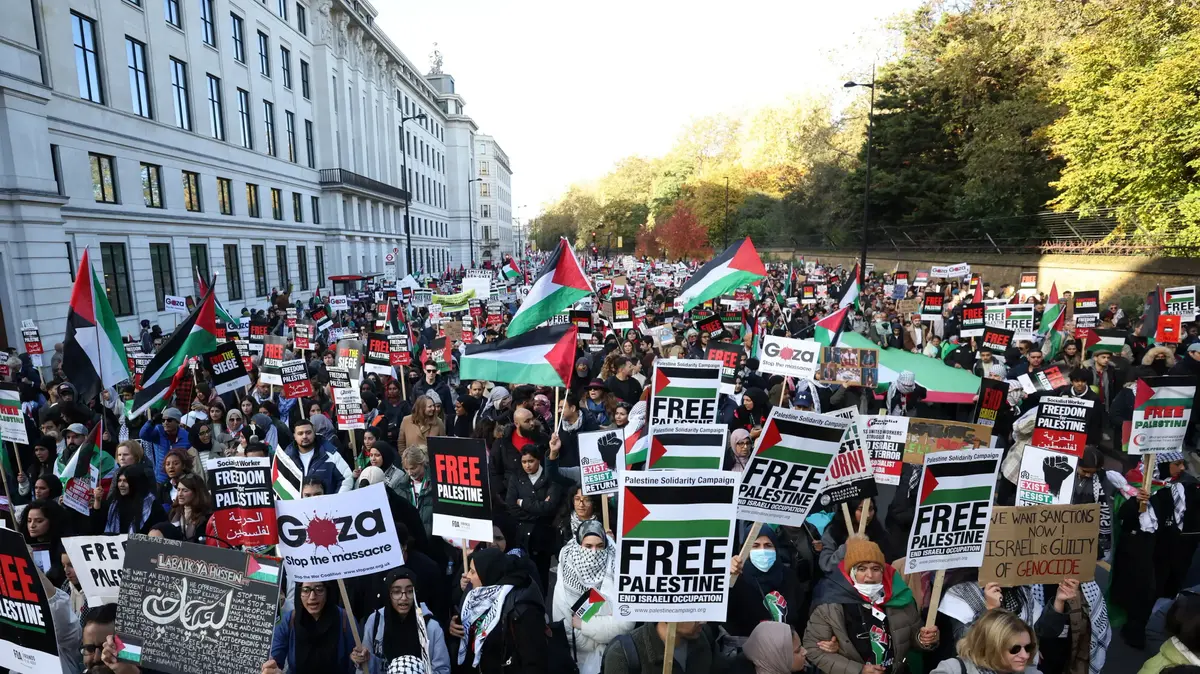One sunny day, the kind of days ready and waiting for surprises, I receive an email from Eva Yildizov, a woman I don't know. Eva asks if I would be interested in coming to a Jewish festival called "Shtetel" that will be held in Brno, the second largest city in the Czech Republic.
I recently finished a stay of about a year in the Mea Shearim area of Jerusalem, and I say to myself: Shtetel can be a good match for Mea Shearim.
And immediately I say to Eva: I will gladly come.
I have no idea how to pronounce the name of this city, Brno: phonetically, it's clear that there is no movement there, but that's perfectly fine for me.
Hebrew and Arabic are also dyslexic languages and I love them anyway.
The question is how do you get to Brno?
I am told that it is best to get there via Vienna.
Turkish Airlines, which is my preferred airline, flies to Vienna via Istanbul, and I immediately go over to buy a ticket.
During the ordering process I am asked if I am interested in a special dish.
Of course I'm interested.
You can choose, among other things, kosher and halal.
I had plenty of kosher in Jerusalem, so I order halal.
Sounds good, doesn't it?
Unfortunately, minutes after the order I receive a message: no halal.
Turkish Airlines, Photo: Photo: Coco
no then no
The deer Israel on your platforms Halal.
I get on the plane and sit down.
When they start handing out the dishes, I notice that passengers on the other side of the aisle are getting kosher meals.
It turns out that Turkish Airlines has kosher meals but not halal.
These Turks, I quickly conclude, must be the greatest philosophers in the world.
Here are Muslims who happily serve you kosher but not halal dishes.
What is it if the Messiah does not die?
On an empty stomach I finally land in Brno, where I am greeted by Eva, who turns out to be a charming and lively lady.
She drives me to the Royal Ritz Hotel in the city center and tells me that she booked for me "the room where Vaclav Havel stayed when he stayed in Brno."
When I arrived more than a year ago at the Hotel Zefania where I was staying in Jerusalem, I was told that years ago the Rebbe of Satmar, Rabbi Yoalish Teitelbaum, had stayed in that hotel. Rabbi Yoalish, the prominent anti-Zionist ultra-Orthodox of his time, used his stay at the Hotel Zefania to tell Jewish leaders who came to visit him that "at the coming of the Messiah, everything that is being built now in the Land of Israel will be destroyed", and therefore nothing should be built in Israel until then. Vaclav Havel, who was strictly a gentile, a famous playwright and the first president of the Czech Republic, is the man because of whom, so I am told, the Czech Republic became Because of the greatness of those who support Israel in general, and the Jews in particular, in Europe as a whole.
And I, as lucky as I am, move from bed to bed, from Rabbi Yoalish's bed to Vaclav's bed, a psychotic experience, especially when my stomach is empty.
Mea Shearim neighborhood (archive, those photographed have no relation to the news), photo: Oren Ben Hakon
Halot, photo: public relations
And there will be evening and there will be morning, and Friday will break.
Oh, Friday morning in Mea Shearim, what a great experience it was!
On every street corner I could get challahs of all kinds and species, including those from Vizhnitz Bakery.
And what will I buy here in honor of Shabbat in this city, a city of Gentiles?
I'm going to look anyway.
My stomach is singing hallelujah
Whoop!
I can't believe my eyes!
Creator of all the worlds - Halut I see.
In Brno?!
Did Satmar Hasidim move to Brno in their escape from the destroyed Israel?
Only these challahs, listen carefully now, are not called challahs.
Here they are called, God forbid, "Christmas rolls".
We, the Jews, brought Jesus into the world, and indirectly Christmas (I'm not sure about Black Friday).
But the real question is: who invented the Halat, us or them?
I buy challah for myself.
Allow me to share with you here, and you may quote me: this is the most delicious challah that has ever come to my mouth.
My belly, believe it or not, sings and dances hallelujah.
With such calamities, is it any wonder that a festival called "Shtetel" runs here?
Eva, a super-energetic Jew, spent her early years as a proud Czech and a devout atheist.
She was born Jewish, but only recently did Judaism begin to have meaning for her.
In recent years she is what is called "approaching", and this includes exclusive responsibility for the production of the shtetl festival.
This is her baby, and despite the fact that this is the first year of the festival, she managed to bring here Jews from all over the world as well as from around the Czech Republic.
And this is just the beginning.
The shtetl festival will be opened today in a ceremonial manner in the royal villa "Lev Ber", which once belonged to a rich Jew of that name until it was nationalized by the government in the Czech Republic.
"My husband will pick you up from the hotel to the villa," I receive a message from Eva.
Indeed, her husband Murat arrives just in time with a big black Ford to pick me up from Vaclav's bed.
Murat, who looks like a Turkish Jew, is a businessman, "but during the festival I am the driver. Eva commissions me to pick up people from here to there, and from there to here."
Uber driver, in short.
A Turkish Jew at the helm.
We arrive a few minutes before the opening event of the festival, and I stare around.
50 or 60 people, and I have no idea who they are.
Are they Shabbat bread people or Christmas bread people?
Are they Rabbi Yoalish's Jews or President Vaclav's Gentiles?
I have no idea.
Here in the Czech Republic, let me share with you, it is not easy to know who is Jewish and who is not.
The Gentiles in this land, someone tells me, are Jews no less than Abraham our father.
Peter Mandel, a Jewish businessman born in Brno who lives in Prague, drives a big, shiny Volvo that costs, in my opinion, no less than two villas.
"Most Czechs are philosophers," he tells me.
That is, the opposite of anti-Semitism.
Why?
"The honest answer: I don't know. But the first shipment of weapons that Israel received in the War of Independence, for example, was a weapon manufactured in Brno."
Peter delves a little into the question and then adds: "The Hussite movement, the followers of the Czech reformer Jan Hus, fought against the Pope already 500 years ago. The Czech tradition is atheism, and the Czech Republic is the most atheistic country in Europe."
And perhaps, he explains to me, this is the reason why the Czech people are much friendlier to Jews than other European nations.
What is the connection?
I ask him.
"When I say 'atheist' I don't mean people without faith. What I mean is that the Czech people do not align themselves according to the church. Churches teach to hate Jews. So the Czechs are atheists in relation to the church, but they believe in God," he answered me, as if A well-known philosopher.
By the way, the Czechs were not always lovers of Jews.
"From 1400 to 1848, Jews were not allowed to live in the cities of this country, except in Prague, where they were considered 'property of the king,'" he adds.
Prague, Czech Republic, photo: Vertical
These days, of course, the Jews are nobody's property.
On the contrary, everyone wants to be near them and love them, says Peter.
It would be good, the thought arises in my heart, if the Chief Rabbinate in Israel loved the Czech Jews as the "atheists" love them here.
A gentile rabbi and a Shabbat cycle
I know a couple in this country (don't ever tell them I mentioned them), the husband is Jewish-Israeli and the wife is Czech.
She converted, and she observes mitzvot with greater devotion than most Jews I have ever met.
This woman could be a Satmari rabbi in this world and the next, but only a rabbi not certified by the rabbinate would be willing to convert her.
Why?
Because her husband does not believe in the resurrection of the dead.
He is ready to keep Shabbat, fast on Yom Kippur, eat only kosher, and even go to synagogue, but the resurrection - this is not.
Orthodox European rabbis, in agreement with those in Israel, will not convert his wife.
Unless she divorces her Jewish husband.
Isn't that strange to you?
Look at the people here near the villa.
Here is a man, wearing a pink shirt and a white hat, and he tells me that he is a general head in Jerusalem.
If he had been born a gentile, no rabbi in Israel would have converted him with this garment, but now he is a total head.
How do you pronounce the word Reno, I ask a young lady whose father is Jewish and whose mother is not.
"Berno", she answers.
I've heard people pronounce it Bruno, I tell her.
"Yes, that's how you pronounce it," she says.
Wait, ma'am: do you pronounce Berno or Bruno?
"Both and both," she answers without batting an eyelid.
This lady, as you can conclude for yourself, is no less Jewish than God, but no Orthodox rabbi would convert her because she is too little Jewish, and no Reform rabbi would look at her because she is too Jewish.
How many Czechs present here are Jews?
I am interested in the Rabbi of Brno, Rabbi Menashe Kliment.
"50 percent," he says.
Another person, far from being a rabbi, tells me that there are maybe two Czech Jews here in total.
In other words: there are two or 30 Jews in the audience here.
The rabbi, who tells me he is Orthodox, testifies that in total there are between six and ten Orthodox Jews living in Brno.
And how many Jews are there in Brno in total?
Around 330, says Rabbi Kliment.
And in the whole Czech Republic?
In Prague 1,600, says Rabbi Karol Ephraim Sidon, the chief rabbi of the Czech Republic, and the total number of Jews in the country is about 3,000.
Prague, photo: Lea Roditi
Whatever the number, the shtetl festival is about to begin.
Foreign guests, local gentiles, two rabbis, the president of the Jewish community of Brno, me, Ava and Murat are present at the ceremony.
The president of the Jewish community of Brno, Yachim Kanark, steps up to the pulpit and preaches to the Jews present about "diversity".
How do you achieve "diversity" with two Jews?
How diverse can it be?
I don't know, but the word sounds politically correct, and it rings a bell.
After the community president's sermon, a woman comes on stage, and she speaks Czech with a heavy Israeli accent.
It's about the Israeli embassy in the Czech Republic, and she tells me that she won't talk to me because I'm a journalist.
Her Highness is accompanied by two members of the Czech Secret Service.
If I ask the same question, they send me back to Turkish Airlines, where there are no Halats.
After the reception we enter the villa to participate in the first artistic event: a play.
"Beautiful Jewish girls"
The play, which is based on a story written by a Jewish-British woman who is anything but a writer, takes place during World War II.
It is Shabbat night, it seems, and the young actresses on stage are lighting Shabbat candles.
Suddenly a cycle and a canopy appear on the stage.
Then, before the author manages to get Gefilte Fish in there as well, sirens are heard going up and down, shells whistling from all sides, and Nazis infesting every corner.
Miraculously, despite the chaos and the unknown death toll, some holy books survive.
In honor of one of them, a cycle that once belonged to the grandmother of the Jewish "writer" from Britain, this play was written.
Even though I have the English version of the play in my hand, I can't keep my head up.
The only thing I'm learning here is this: "menstruation" is from the root of Hazara, because the Jewish holidays come back every year. As you probably know, the Gentile holidays do not come back every year, so there is no Christmas cycle. Not even in Wizenitz's bakery.
How did we get from Shabbat to the holiday and the roof?
In Britain they don't pay attention to subtleties, I guess.
"They are beautiful Jewish girls," the writer's husband tells me in a magnificent British accent, as he stares at the actresses.
Are they really Jewish?
I approach them and ask them if they are Jewish.
"No", they say.
But one of them, who left a moment ago, is "half Jewish-Czech and half Muslim-Turkish".
Could it be, I ask myself, that the half-Jewish-half-Muslim woman is none other than Eva and Murat's daughter?
Murat, the thought creeps into my head, is not a Jewish-Turkish Uber driver but a Muslim-Turkish Uber driver.
Oh no.
Is our world beginning to be destroyed as Rabbi Yoalish prophesied?
After the play, food and wine are served outside.
Among the guests I suddenly notice a group of English speakers.
Where are you from?
I ask them.
"We are from Canada and Australia. This is our first visit to the Czech Republic," says one of them, "and we came here specifically to participate in the festival."
Did you come all the way here to see gentiles lighting Shabbat candles with menstruating in their hands?
"Well, well, not exactly."
So why are you here?
"Tomorrow, as part of the festival, we will have the opportunity to see the house where our grandfather lived as a child."
Have you come all the way from Australia and Canada to see the house your grandfather lived in when he was little?
"Yes, we want to connect with the past."
Are you preparing to claim ownership of the house...?
Here they give me answers that would not embarrass the great scholars in the Lithuanian yeshiva.
Yes and no, at the same time.
both.
Berno and Bruno.
Murat, who tells me his daughter is one of the actresses, has no claim to ownership of any villa, and he takes me to see another villa, Villa Tugendhat, a luxurious building with many rooms in the Bauhaus style.
Tannenboom, photo: I.A.P
"Jazz? Pure Jewish music"
Like many other villas in the area, Tugendhat Villa once belonged to a rich Jew.
The Jew was sent to Auschwitz, and after the war the Communist Party took over the property, and it is now the property of the state.
Why was the villa not transferred to the heirs?
I ask a nice Czech Jew.
"This is something the government cannot do."
Why not?
"There are quite a few villas in this city, and if the government transfers them to the Jewish heirs - all the villas will belong to the Jews."
And what's the problem with that?
"This is just one reason for this. The sad truth is that there are no heirs. Entire families were sent to the gas chambers."
At this point Murat and I leave the villa, sit down on a bench in the city center, and it opens.
He tells me that he is a Muslim, and that his wife, Eva, is Jewish.
Every day that passes she gets closer and closer to Judaism, he tells me, and he gets closer and closer to Islam.
Both return to their roots, which belong to two trees in separate forests.
And it's not easy.
"Before we got married, Eva promised to raise the girls as Muslims, but she doesn't. So we raise them both. She raises them as Jews, and I - as Muslims. At home, I read from the Koran to my two daughters, and they cover their heads while reading, as is the commandment of Islam. My eldest daughter is Melika, and the youngest is Aileen."
Isn't it Esther?
I heard her name is Esther.
"Eva calls her Esther; I call her Eileen."
And what is her official name?
"Esther Ilin".
Murat takes his daughters to Turkey often, so that they can be there with the grandparents.
They act like 100 percent Muslims there, he says.
What do your parents think about the whole story?
"They don't know that my wife is Jewish. They think she was a Christian before we got married and that today she is a Muslim. When she converted to Islam---"
What, Eva converted to Islam?
"Yes, before we got married. She declared in front of witnesses that there is no god but Allah and that Muhammad is his prophet, and we gave her the name Ingie. And that's what my father calls her too."
Did she believe in Islam then?
"No, she did it for me."
We talk on and on, about da and ha, until the Jewish mother and her daughters join us.
The girls hug their father with great love, and Murat is beaming with happiness.
Murat: "They love me. Even when I come home sweaty and smelly, I get a hug. They even like my sweat. I have no complaints. Eva produces this festival and at this time I am the driver. I help my wife produce her Jewish festival."
What do the girls think?
Esther Ilin: "I am one hundred percent Jewish and one hundred percent Muslim."
Malika: "Me too."
Esther Ilin: "When I pray, I say three surahs (from the Koran) and then listen Israel."
If a war breaks out between Jews and Muslims, which side will you join?
Malika: "One of us will join the Jewish side, and the other the Muslim side."
In other words, they will shoot a woman at her sister.
Ava interjects: "You have to understand something, our marriage works because we never ask these questions."
Do you consider yourselves daughters of the Jewish tribe?
Esther Ilin: "50 percent Jewish."
Malika: "I am 100 percent Jewish according to tribe, but by faith I am Muslim."
Many events take place around us as part of the shtetl festival: symposia, concerts, discussions, parties, music.
There are even jazz musicians from Israel.
What is the connection between jazz and Judaism?
"What are you talking about?", one American Jew says to me, "Jazz is pure Jewish music."
Avishai Cohen in the days when he was the artistic director of the jazz festival in Eilat, photo: Coco
I leave the girls who might one day shoot each other, and go with Murat to the Jewish community center for a short visit.
There is no visible sign outside the building indicating that there may be Jews around.
The building is multi-level and has a heavy metal door at the entrance.
I go inside.
Cakes and muffins are laid out in abundance on two long tables, pictures of different sizes hang on the walls, and there are about 40 people in the place.
"How many of us are real Jews?"
The people around me are proud to be Jewish, they tell me, but many of them are not recognized as such by the Chief Rabbinate of Israel.
They hope that everything will somehow work out someday, and that they will fulfill their Jewish dream sooner rather than later.
Have any of them encountered anti-Semitism?
Only two say yes.
What kind of antisemitism is this?
One of them says that not long ago someone told him that Jews killed Jesus;
The second one remembers that she once heard from someone that Jews have a lot of money.
If that's all the trouble, I say to myself, Israel has more anti-Semitism than the Czech Republic.
And regarding the two cases: the idea that the Jews are the "killers of Messiah" is not new and already appears in the New Testament.
And in the context of Czech Jews and money: according to local Jews, the Jewish community of Brno owns many buildings in the city.
How many buildings?
No one knows.
What do they do with the money?
Nobody knows that either.
Wonderful are the ways of God.
"can I ask you a question?"
One of those present turns to me.
"How many of us do you think are real Jews?"
I have no idea.
And the truth is, they don't know either.
They define themselves as Jews, and some even plan to immigrate to Israel.
They are ready to convert, so that no one doubts their Jewishness, but the rabbinate in Israel does not recognize either the rabbi of Brno or the rabbi of the Czech Republic.
This means that if one of these two rabbis converts, kites can be made from the conversion certificates.
The person who wants to convert will have to follow a rabbi whom the rabbinate recognizes and be careful not to fall in love with a Jewish girl in the meantime, lest the Jewish girl not believe in the resurrection of the dead and then he will have to remain a complete gentile until the coming of the Messiah.
Do you have a synagogue in this building?
I ask those present.
"No, the synagogue is in another part of the city."
And out of curiosity I make my visits to the synagogue the day after Shabbat.
The synagogue, as far as I know, is Orthodox, the only one that exists in Brno and the only one active in the entire region of Moravia.
From the outside it looks more like a warehouse than a synagogue, and I wonder why.
"The Jews wanted to have a simple structure," Tanya, who speaks Czech, Hebrew and English, tells me.
She looks and dresses like a Satmar Hassid from Yoel Street in Mea Shearim.
The interior design of the synagogue, like its exterior design, is the height of simplicity.
Doesn't come close to the majestic and magnificent churches around Brno.
Why so?
"Because that's what the Jews wanted. They wanted the Bauhaus style."
minimalistic
How many Jews come to synagogue regularly?
"On Shabbat there are seven people on average. Sometimes more, sometimes less."
As the building so the number.
minimalistic
Once, when more Jews lived here, there were two more synagogues in Brno.
How many Jews lived here at that time?
"Before World War II - 12 thousand".
And what happened to the other two synagogues?
"One was destroyed by the Nazis in 1939, and the other by the communists in 1985."
Tanya doesn't sound like a very Jewish name to me.
How did you get that name?
"I'm not Jewish, I'm Protestant."
You look like a Jew --- "but I'm not".
And you speak Hebrew --- "We in the Czech Republic are very interested in Jews and Jewish culture."
Antisemitism in London, photo: AP
Every Gentile is a Jew, and vice versa
And so, as the festival draws to a close, I meet with Murat and ask him to share his thoughts with me.
He is happy that someone is interested in them.
He has a dream, he tells me.
Soon, Allah knows exactly when, "Turkey will become an empire again and rule over all countries, including Africa and the Middle East."
Including Israel?
"Obviously. Israel is in the Middle East!"
He looks up to the sky, hoping that Allah is listening and shortens the schedule.
ובעודו משוחח עם אללה אני נפרד ממנו לשלום, ופוסע לאיטי ברחוב. בתוך דקות ספורות אני רואה את אווה, והיא פוסעת לידי, מאושרת ככלה בליל כלולותיה. "לאן שלא הלכתי היום בברנו שמעתי מוזיקה יהודית. אני כל כך שמחה!" היא מתפללת לאלוהי ישראל שבעוד שלוש שנים לכל היותר היא תצליח גם להקים בית ספר יהודי בברנו.
לאט אבל בטוח פסטיבל השטעטל מסתיים, ואני יוצא לביקור בעברה היהודי של ברנו. כן, אני הולך לבית הקברות היהודי.
טננבום, צילום: אי.אף.פי
המצבות בבית הקברות מדהימות, ויש מהן בלי סוף. הנה, הביטו, מצבתו של היהודי לֶב בֶּר, נראית בעצמה כמו וילה. יהודי צ'כיה, אני מתרשם בעוברי בין המצבות, הצליחו כאן מאוד, אולי יותר מאשר במקומות אחרים באירופה. מקום מעורר השראה הוא ברנו, אפילו בקבריה.
Next year, if you want to take a short vacation from Israel, come to the shtetl in Brno.
Walk the streets of this beautiful city and experience the strange feeling of being enveloped in love just because you are Jewish.
I pray that when you get to Brno you won't get caught in the crossfire between two sisters, strictly Jewish according to Halacha and the rabbis, shooting each other mercilessly.
And don't forget to buy the local Halat, super-halal.
In Brno, as you probably know, every day is Christmas, every holiday is Shabbat, every Gentile is a Jew, every Jew is a Gentile, and there is even a Shabbat cycle here.
What a wonderful world.
were we wrong
We will fix it!
If you found an error in the article, we would appreciate it if you shared it with us



/cloudfront-eu-central-1.images.arcpublishing.com/prisa/VB2FZXRBEFBPNAN5IFP75J6YOM.jpg)











